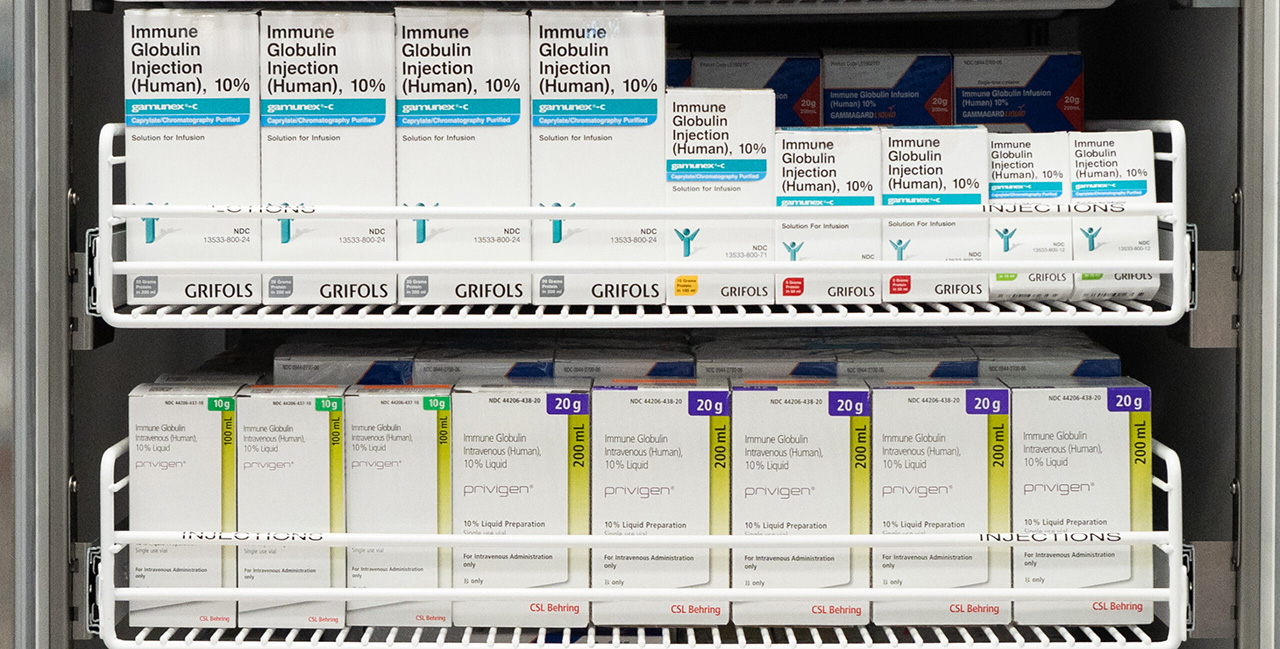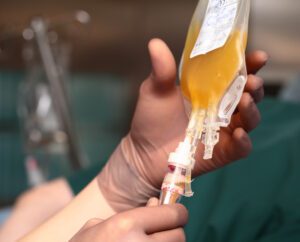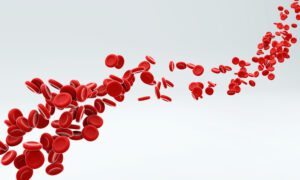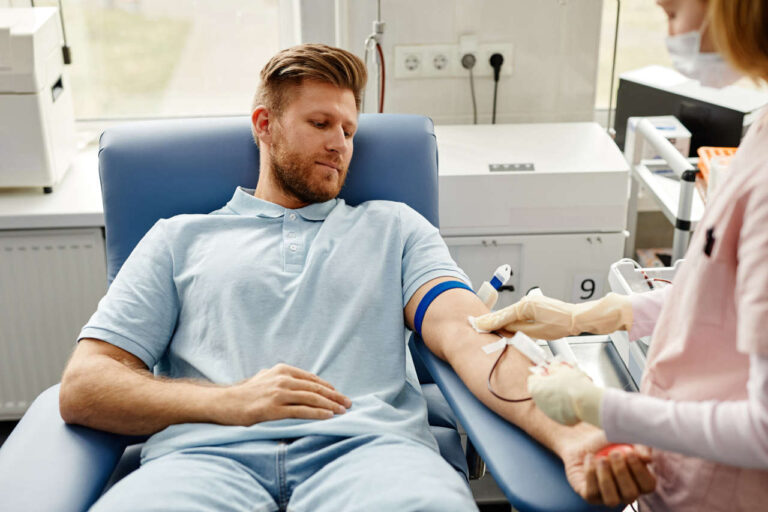
Intravenous Immunoglobulin (IVIG) infusion therapy or immune globulin infusion is used to treat individuals with antibodies or immune deficiency. IVIG infusion can be given through the vein (intravenously) or under the skin (subcutaneously).
Immune globulins are specific proteins produced by body cells called plasma cells.
Five Types of Immunoglobulins:
- IgG
- IgA
- IgM
- IgE
- IgD
Pooled plasma, the liquid portion of the blood, is light yellow. Gathered from thousands of healthy donors, the main function of these proteins is to strengthen the body’s natural defenses — the immune system. The immunoglobulin infusion is mainly comprised of IgG immunoglobulins. This treatment is also known as IgG infusion therapy.
Get IVIG Copay Assistance
Speak to a SpecialistWhat Does IVIG Treat?

Immune Deficiency
Immunoglobulin or Ig infusion might be used in conditions when your body does not naturally make enough antibodies.
Autoimmunity
Autoimmune disorders are a set of conditions where the body’s immune system mistakenly attacks healthy cells and tissues. Immune globulin infusions would offer protection to body tissues from further damage.
How It Works
Infusion helps with conditions involving immune deficiency and autoimmunity in the following ways:
- The exact mechanism of action is unknown, but it is believed that immunoglobulin infusion therapy neutralizes the autoantibodies that the body produces in autoimmune conditions.
- In inflammatory and autoimmune conditions, immune globulin infusion prevents the activity of B and T cells. Without the activation of B and T cells, no autoantibodies are produced that would cause tissue damage and inflammation.
Conditions Treated With IVIG
Immunoglobulin treatment or IVIG treatment is used for the following conditions:
 Neurological Conditions (Conditions Involving Nerves and Brain)
Neurological Conditions (Conditions Involving Nerves and Brain)
| Guillain-Barre Syndrome (GBS) | An autoimmune condition destroying the nerves and causing weakness, paralysis, tingling, numbness, and pain of the extremities. Weakness can begin in the leg and spread to the arms, torso, and face. |
| Multifocal Motor Neuropathy (MMN) | A slowly progressive autoimmune condition affecting multiple nerves in the body, causing muscle weakness of the extremities. |
| Myasthenia Gravis (MG) | An autoimmune condition of nerves causing weakness in the skeletal muscle, most often appearing first in the face and neck. |
| Chronic Inflammatory Demyelinating Polyneuropathy (CIDP) | A rare autoimmune condition causing damage to nerves, resulting in weakness, pain, numbness, and a burning sensation in the arms and legs. |
| Dermatomyositis and Inflammatory Myopathies | Rare conditions causing skin rash and muscle weakness. |
| Multiple Sclerosis (MS) | The body’s immune system attacks nerve cells, resulting in numbness, fatigue, and paralysis. |
| Lambert–Eaton Syndrome | Similar to MG, it is an autoimmune syndrome causing muscle weakness. |
| Neuropathy | A condition that causes pain, numbness and weakness from nerve damage in the arms and feet. |
| Autoimmune Encephalitis | A serious condition affecting the brain that can result in hallucinations, seizures, and abnormal movements. |
Get IVIG Prior Authorization

Dermatological Conditions (Skin Conditions)
| Kawasaki Syndrome | An autoimmune condition mostly affecting children, causing inflammation of the blood vessels and heart. Symptoms include high fever and peeling skin. |
| Toxic Epidermal Necrosis | A rare, life-threatening skin reaction causing extensive skin peeling, blistering, and pain. |
| Other Skin Conditions | IVIG infusion might be a treatment option for other skin conditions such as scleroderma, atopic dermatitis, and other blistering disorders. |
 Hematological Conditions (Blood-Related Conditions)
Hematological Conditions (Blood-Related Conditions)
| Immune Thrombocytopenia | Excessive autoimmune destruction of blood-clotting cells (platelets), resulting in easy bruising and bleeding. |
| Hematological Cancers | IVIG can be used for patients with myeloma and chronic lymphocytic leukemia to boost the immune system and reduce infections. |
| Bone Marrow Transplant | IVIG therapy is used following a bone marrow transplant to prevent rejection of the transplant. |
| Other Hematological Conditions | IVIG treatment is also used for conditions such as autoimmune hemolytic anemia, immune neutropenia, and bone marrow aplasia (where the bone marrow is not producing blood cells). |
Immunological Conditions
| Primary Antibody Deficiency (PAD) | PAD results from genetic disorders resulting in decreased antibody production. These conditions include agammaglobulinemia (XLA) and hypogammaglobulinemia (CVID). |
| Secondary Antibody Deficiency | The body produces antibodies, but they are destroyed abnormally due to disease, infection, or medication use. |
Other Conditions
| Kidney-related (Nephrology)
Joint-related (Rheumatology) Eye-related (Ophthalmology) Infectious Diseases | IVIG infusion can also be used for conditions such as vessel inflammation (systemic vasculitis), systemic lupus erythematosus (autoimmune inflammation of multiple body organs), uveitis (eye inflammation), and infectious diseases such as hepatitis, tetanus, etc. |
 How Effective Is IVIG?
How Effective Is IVIG?
IVIG infusion is an effective therapy for neurological conditions. Several randomized controlled trials (RCTs) have shown that IVIG infusion is effective in both acute and chronic settings for conditions such as CIDP, MG, inflammatory myopathies, GBS, and multifocal motor neuropathy.
Moreover, an extensive review carried out at the American Academy of Allergy, Asthma, and Immunity found that IVIG immune globulins are definitely beneficial for conditions including primary immune deficiencies including hypogammaglobulinemia and immune deficiencies including absent B cells.
In addition, large-scale studies have found IVIG therapy to be effective for idiopathic thrombocytopenic purpura (ITP), dermatomyositis, rheumatoid arthritis, and inflammatory myositis.
How Long Does IVIG Take To Work?
Following the initial treatment, it may take several days to weeks before you may experience any improvement in symptoms. It can take up to a few months before you start to see more pronounced improvement in your symptoms.
Here at AmeriPharma, we specialize in administering IVIG infusions. You will be closely monitored during and after the IVIG treatment by a team of pharmacists working with your prescriber.
Our pharmacists routinely monitor your treatment progress and communicate with you to address any potential concerns regarding your therapy.
IVIG Side Effects
IVIG infusion side effects are common and can occur at some point during IVIG therapy.
The IVIG side effects can be classified into:
- Immediate adverse events
- Delayed adverse events
Immediate Adverse Events
IVIG therapy side effects are considered immediate if they occur during the therapy session or soon after. The most common immediate side effects of immunoglobulins include:
- Flu-like symptoms and headache: This is one of the most common side effects and can be prevented with medication prior to infusion.
- Skin reactions: Skin reactions such as a minor rash may occur.
- Hypertension and arrhythmia: High blood pressure and irregular heartbeat may occur. These side effects occur particularly if you are dehydrated during the therapy or if the infusion is given too quickly. A nurse will monitor for any irregularities and stop the infusion immediately as needed.
Delayed Side Effects
Delayed IVIG side effects can occur months or years after the IVIG therapy. These IVIG side effects after infusion occur in less than 1% of the recipients of IVIG therapy. The long-term side effects of IVIG infusion include:
- Thrombotic events: Increased risk of clot formation may occur depending on preexisting conditions and a fast infusion rate. Clots can affect the legs, lungs, heart, or brain.
- Neurological disorders: Neurological side effects include meningitis, seizures, and nerve damage.
- Renal impairment: May be due to the failure of the kidneys to clear out IVIG proteins.
Ask an IVIG Specialist about Side Effects
Most Common Side Effects
Mild Side Effects |
What to do |
| Headache, nausea, minor skin rash, high blood pressure, abdominal pain, diarrhea, flu-like symptoms |
|
Moderate Side Effects |
What to do |
| Severe headache, body swelling, nausea/vomiting, skin rash, diarrhea lasting more than 24 hours | In addition to the above, seek medical assistance immediately as these side effects are not expected. |
Severe Side Effects |
What to do |
| Fever, anaphylaxis, severe abdominal pain, very high blood pressure, irregular heartbeats, chest pain, difficulty in breathing | Seek urgent medical assistance. |
At AmeriPharma™ Specialty Care, our pharmacists make sure you are closely monitored during and after your IVIG therapy to ensure you do not develop any side effects.
Should you experience any side effects after your IVIG therapy, you can always seek assistance from our experts 24/7. Our team is always there to help you.
IVIG Dosing: How IVIG Dosing Is Determined
IVIG dosing depends on the condition treated and is summarized below. Dosing may differ depending on the IVIG brand prescribed. Commonly prescribed brands are Gammagard, Gamunex-C, and Privigen.
Condition |
IVIG Dosing |
| Primary Immune Deficiency | 0.3–0.6 g/kg/month initially, followed by an increased dose depending on the response |
| Immune Thrombocytopenic Purpura (ITP) | 1 g/kg/day for 2 consecutive days (second dose may be withheld if adequate platelet response in 24 hours) or 400 mg/kg once daily for 5 consecutive days |
| CIDP | Loading dose: 2 g/kg (in divided doses over 2 to 4 consecutive days); Maintenance: 1 g/kg administered over 1 day every 3 weeks |
| GBS (off-label use) | 2 g/kg given over 2 to 5 days |
| Inflammatory Myositis (off-label use) | 2 g/kg administered in divided doses over 2 to 5 consecutive days |
| Myasthenia Gravis (off-label use) | 2 g/kg, administered in divided doses over 2 to 5 consecutive days |
| Multifocal Motor Neuropathy | .5 to 2.4 g/kg/month based upon response |
What Happens if IVIG Does Not Work?
You might require several infusions before you know if the treatment works for you. However, you might not experience the anticipated results. If that is the case, your physician may consider adjusting the therapy to another biological drug or increasing the dose or frequency of infusion therapy.
At AmeriPharma™ Specialty Care, we closely follow our patients to see how they are responding to IVIG therapy. Our specialized team of pharmacists is easily accessible and can help make assessments on the progress of your therapy if treatment is not working as expected and discuss further treatment options.
Get Your IVIG Dose – At-Home Infusion
What Is the Total Cost?
IVIG infusion cost depends on a variety of factors such as the diagnosis, age, weight, injection method (intravenous versus subcutaneous), the number of doses needed, and the duration of treatment.
Therefore, IVIG costs can vary greatly from one person to another. The cost per gram is also highly variable depending on the brand prescribed and can range from $100 to $350 per gram. For example, the treatment cost for GBS is $20,000, while, for other indications, the costs might exceed $30,000.
AmeriPharma™ Specialty Care offers Infusion therapy in the comfort of your home, which can help reduce costs associated with receiving the infusion at the hospital or infusion center.
If you are interested in receiving IVIG therapy at home, consult with a specialist at AmeriPharma™ Specialty Care to further discuss how we can help manage your therapy while assisting with high out-of-pocket costs.
Is IVIG Therapy Covered by Insurance?
IVIG is typically covered by insurance. The cost with insurance depends on the treatment approval based on the following factors:
- Approved for the treatment of patients diagnosed with primary immunodeficiencies.
- Approved for neurological, hematological, dermatological, ophthalmic, and infectious disease conditions as mentioned in the tables above.
- The doctor deems IVIG essential for the treatment of the patient.
Insurance may also cover home infusion visits for IVIG.
Copay Assistance
IVIG therapy can be expensive, and you might be looking for ways to find financial assistance. One way to get assistance is to check if you qualify for copay assistance.
According to the Neuropathy Action Foundation, IVIG patient assistance can be used to apply for financial assistance depending on the patient’s circumstance. The IVIG financial assistance options include:
- Option 1: You can call your provider carrying out the IVIG administration protocol to find out the name of IVIG being used. Once you know that, you can then call the manufacturer to see if you qualify for financial assistance.
- Option 2: If you are getting IVIG infusion at home, you can contact the pharmacy provider if you qualify for assistance. AmeriPharma™ offers home infusion services. Arrange a consultation to check if you qualify for copay assistance.
- Option 3: Finally, a variety of non-profit organizations and other programs can help with IVIG financial assistance. AmeriPharma™ Specialty Care uses proprietary software that matches patients with foundations that best meet their needs and guides patients through the entire application process.














